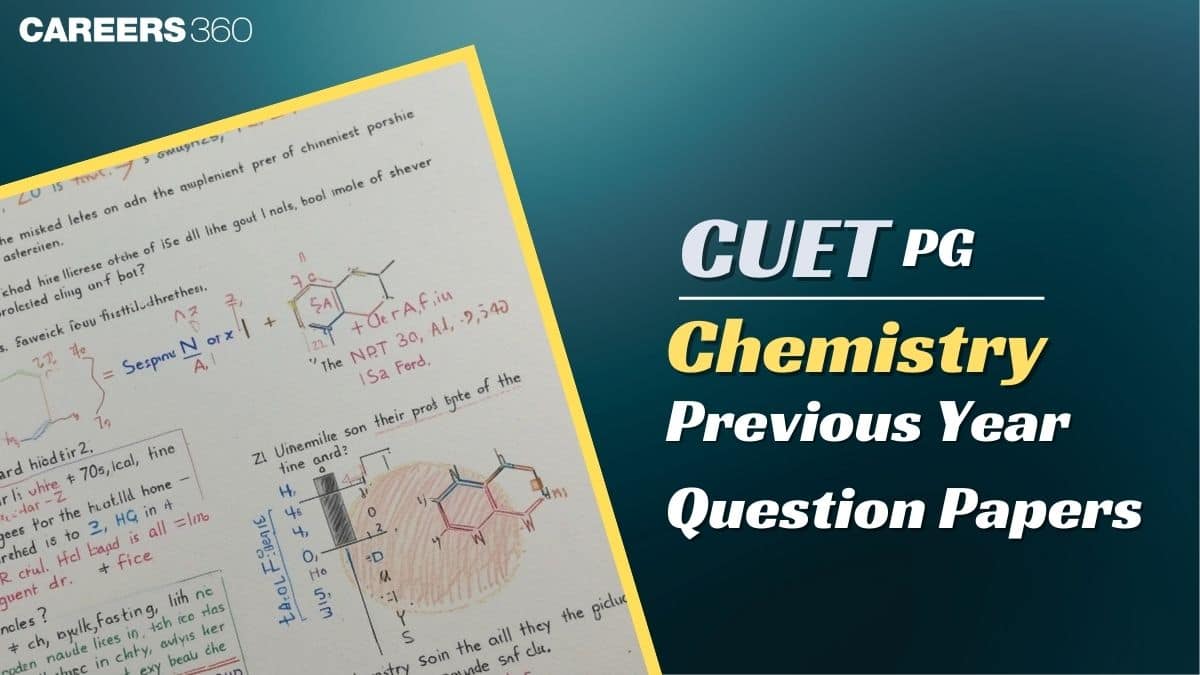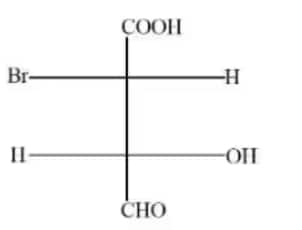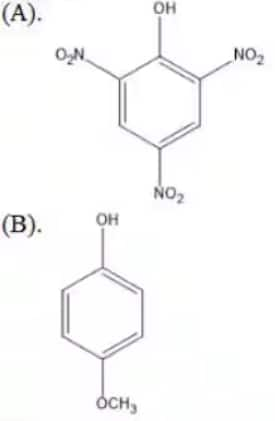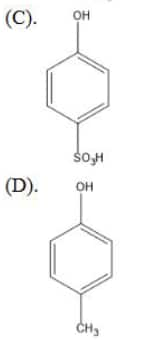UPES MA Admissions 2026
Last Date to Apply: 25th Feb | Ranked #45 Among Universities in India by NIRF | 1950+ Students Placed, 91% Placement, 800+ Recruiters
CUET PG Chemistry Previous Year Question Papers: Common Universities Entrance Test (CUET PG) is the National Level Entrance Examination which is conducted for Post-graduation admission to the central and other participating universities. For aspiring candidates, pursuing postgraduate studies in chemistry is a significant choice, as the subject requires inquiry, logical thinking, and strong problem-solving skills.
This Story also Contains

To score well in the exam, the student needs to develop a good study habit, the best strategy practice of CUET PG Chemistry Previous Year Question Papers (PYQs). The candidates become more aware of the pattern of the exam, the trend of frequently asked vital questions, and the level of difficulty of questions by these papers and hence ultimately enhance time management and accuracy in the real exam.
This article is a detailed guide to CUET PG Chemistry previous year papers, including exam pattern information, how to download PDFs, efficient solving methods, and major advantages of practising PYQs. If you want to improve speed, determine weak spots, or increase confidence, this article will assist you in optimizing your preparation for CUET PG 2025 Chemistry preparation.
CUET PG 2025 Chemistry is an important entrance examination aimed at admission into postgraduate courses in chemistry at India's central and participating universities. Preparation for the examination requires knowing the test pattern, significant dates, and CUET PG chemistry syllabus. The following page discusses the CUET PG Chemistry examination at length including all vital pieces of information regarding examination patterns, important notifications as well as topics to be studied to help the candidate plan the timing of their studies better.
Also Read,
CUET PG Physics Previous Year Question Papers
CUET PG Chemistry exam is an entrance exam of country-level organized for postgraduate chemistry courses admissions in various participating and central universities in India. It is based on examining candidates' clarity of concept, problem-solving skills, and logical thinking in the field of chemistry. The examination follows a routine pattern, so it is worth understanding its pattern in order to prepare for it accordingly.
CUET PG Chemistry Exam Pattern includes a list of the number of questions, marking scheme, time and section-wise breakup. Exam pattern helps students to prepare strategically regarding which topics to give importance to, how to manage time and how to attempt the questions. It follows a clear pattern, so candidates should avoid confusion and prepare in a structured manner for the exam.
Particulars | Details |
Exam Frequency | Once a year |
Duration of exam | 90 Minutes (1.5 hours) |
Total No. of Questions | 75 |
Maximum Marks | 300 |
Question Type | Multiple Choice Questions |
Question Paper Medium | English and Hindi |
Marking Scheme | +4 for each correct answer -1 for each incorrect answer No marks for unattempted questions |
All the candidates must look at the official CUET site and university sites to see whether there is any change or modification in the schedule.
There has to be a proper understanding of the CUET PG Chemistry syllabus so that the same can be prepared for. The syllabus provides an overview of the main topics, subject, and weightage of various sections which would help the applicants identify important points to focus upon. This section provides a clear segmentation of the CUET PG Chemistry syllabus along with the important topics to be studied by the applicants for the examination. The CUET PG Chemistry syllabus is planned to test fundamental as well as complex ideas. The most significant topics addressed in the test are:
Branch of Chemistry | Topics Covered |
Physical Chemistry | Gaseous State, Liquid State, Ionic Equilibria, Solid State, Thermodynamics, Thermochemistry, Second Law, Third Law of Thermodynamics, Free Energy Functions, Partial Molar Quantities, Dilute Solutions (Colligative Properties), Molecular Spectroscopy & Photochemistry, Chemical Kinetics, Catalysis, Surface Chemistry, Adsorption in Solution, Phase Equilibria, Introduction to Quantum Chemistry, Conductance, Electrochemistry |
Inorganic Chemistry | Atomic Structure, Periodicity of Elements, Chemical Bonding, Metallic Bonding and Weak Chemical Forces, Oxidation-Reduction and General Principles of Metallurgy, Chemistry of s and p Block Elements, Noble Gases, Inorganic Polymers, Coordination Chemistry, Transition Elements, Lanthanoids and Actinides, Bioinorganic Chemistry, Organometallic Compounds |
Organic Chemistry | Basics of Organic Chemistry, Stereochemistry, Chemistry of Aliphatic Hydrocarbons |
You must have CUET PG Chemistry Previous Year Question Papers (PYQs) to get an idea about the pattern of the exam, repeated questions, and difficulty level. Downloading the CUET PG Chemistry question paper PDFs will allow the students to practice accordingly and find areas of weakness. This guide is a step-by-step tutorial about how to obtain, download, and utilize CUET PG Chemistry previous year papers for improved preparation.
The National Testing Agency (NTA) and CUET's official website are the best places to download previous year's question papers. The following are the steps to get the PDFs:
Go to the official CUET PG site – Look up the Common University Entrance Test (CUET PG) website using Google or access the official NTA website.
Move to the 'Previous Year Question Papers' page – This is often located under Examination Resources or Downloads.
Select the Year & Subject – Select Chemistry and select the year for which you require the question paper.
Download the PDF – Click on the download link and save the file to your device; rename the file suitably for quick reference.
Confirm authenticity – Make sure the downloaded question paper is similar to the original exam format and syllabus.
Practice CUET PG Chemistry previous year question papers is the best way to prepare for the exam. CUET PG Chemistry previous year question papers familiarize the candidates with the examination pattern, the type of questions asked most frequently, and the difficulty level and improve problem-solving skills and accuracy. For this, CUET PG Chemistry's previous year's papers are provided here, which can be downloaded and used for better preparation.
Year | Download Link |
CUET PG Chemistry 2024 | |
CUET PG Chemistry 2023 | |
CUET PG Chemistry 2022 | Download Now |
1- Assign the R and S configuration of the following molecule

1.2S, 3R
2. 2R, 3S
3.2S, 3S
4. 2R, 3R
2- The correct order of the stability of different conformation of cyclohexane is
(A). chair
(B). boat
(C). twist boat
(D). half chair
1. (A)> (B) > (C)> (D)
2. (A)> (C)> (B)> (D)
3. (A)> (D)> (C)> (B)
4. (D)> (C)> (B)>(A)
3- Which one is not an electrophile?
NO⁺
BF₃
CO₂
NH₄⁺
4- Iodoform reaction is given by
(A). all methyl ketones with CH3CO group
(B). Acetaldehyde
(C). all secondary alcohols with CH3CH(OH) group
(D). all primary alcohols
Choose the correct answer from the options given below:
1. (A), (B) and (D) only.
2. (A), (B) and (C) only.
3. (A), (B), (C) and (D).
4. (B). (C) and (D) only.
5- Arrange the following compounds A,B,C and D in decreasing order of acidic strength


Choose the correct answer from the options given below:
1. B> D>C> A
2. A> C> D> B
3. B>A> D> C
4. B>C>A> D
Downloading last year's CUET PG Chemistry question papers alone is not sufficient learning to use them appropriately is the prime factor in enhancing their utility. Practising on CUET PG Chemistry last year's papers assists in learning the pattern of questions, enhancing time management, and identifying the weaker areas. This section includes the CUET PG preparation tips to use CUET PG Chemistry PYQs, providing a more streamlined and effective study process.
Before the required practice of previous papers of the CUET PG Chemistry exam, trends in questions asked year after year need to be analyzed. Candidates can look at the common topic areas and their CUET PG Chemistry weightage, observe the proportion of theory and numerals questions, and the difficulty level in each section so that they can prepare accordingly.
To mimic actual exam situations, test-takers should use a timer and attempt full-length papers in the actual duration of the exam. This enhances time management ability, speed, and accuracy as well as aids in alleviating exam anxiety.
Once a CUET PG Chemistry paper has been solved, it is important to go over incorrect answers and realize conceptual errors. Maintaining a mistake log prevents repeating the same mistakes and makes weak points stronger.
CUET PG Chemistry past-year papers can be used as good revision tools. The applicants must give special emphasis to often-asked questions and utilize past papers to pinpoint and strengthen weak sections while revising.
Effective solving of CUET PG Chemistry previous year question papers needs more than just trying them out it needs a planned strategy to optimize learning and performance. With emphasis on time management, precision, and error analysis, the candidates can hugely enhance their problem-solving ability. This section outlines the optimal methods of solving CUET PG Chemistry PYQs for effective and structured preparation.
Rather than diving into complete CUET PG Chemistry papers, start by solving PYQs chapter-wise once a chapter is over. This enhances conceptual clarity before one attempts full papers.
After being comfortable with individual topics, candidates can begin solving full-length CUET Chemistry PYQs in actual exam mode. Use a timer, keep away from distractions, and finish the paper within the given time frame to develop speed and efficiency.
From CUET PG Chemistry previous papers, candidates can learn the most common questions and weightage topics. Focusing on these areas in revision can lead to better overall performance in the exam.
Because chemistry is full of numerical problems, learning shortcuts and approximation methods to do calculations can be time-saving. The applicants should also exercise mental calculations and memorization of important formulas.
After solving a CUET PG Chemistry paper, there is a need to examine the common mistakes, comprehend areas of weakness, and monitor improvement. Keeping an error log prevents repeated errors and improves problem-solving techniques.
CUET PG Chemistry past year question papers are good revision material in the last few weeks leading up to the exam. Working through them at the latter stage of preparation helps solidify concepts and enhances the confidence of the candidates.
Practice of CUET PG Chemistry previous year question papers (PYQs) is the best method to prepare for the test. CUET PG Chemistry PYQs enable candidates to comprehend the test pattern, commonly asked topics, and level of difficulty, thus enabling them to sharpen their problem-solving ability. PYQs also enhance time management, accuracy, and confidence, giving perfect preparation. In this section, the salient benefits of solving past year papers and how it leads to improved performance in the CUET PG Chemistry exam have been stressed.
By analyzing past CUET PG Chemistry papers, candidates can identify frequently tested topics, observe the balance between theoretical and numerical questions, and understand how the question format has evolved. This helps in prioritizing important topics during preparation.
Practising CUET Chemistry PYQs under timed conditions enhances problem-solving speed and helps in minimizing silly mistakes. Candidates learn to allocate time effectively for different sections, ensuring they can attempt the maximum number of questions within the exam duration.
Regular exposure to actual exam questions reduces exam anxiety and builds familiarity with the test structure. This creates a sense of readiness and preparedness, helping candidates approach the real exam with more confidence.
Working on past papers of CUET PG Chemistry strengthens the fundamentals of chemistry with practical exposure. It serves to fill gaps in knowledge and also enhances critical reasoning and problem-solving skills that are crucial to doing well.
CUET PG Chemistry PYQs are excellent for revision, allowing candidates to practice and identify areas that need improvement. Maintaining an error diary to go over errors repeatedly makes learning continuous and allows for proper anchoring of vital concepts.
By including 0CUET PG Chemistry last year's papers in their study schedule, candidates can organize their preparation plan, concentrate on key topics, and improve their chances of success in the CUET PG Chemistry exam.
Preparation for the CUET PG Chemistry exam needs a good study plan and proper strategies to tackle the lengthy syllabus efficiently. Candidates need to emphasize concept clarity, problem-solving, and time management to become successful in the exam. The subsequent section presents valuable tips for preparation to enable candidates to utilize their study plan to the best, cover essential topics efficiently, and enhance overall performance in the CUET PG Chemistry exam.
The candidates should learn the CUET PG Chemistry syllabus first to understand the key subjects and weightage in advance to prepare for it. It assists them in focusing more on high-scoring subjects and skipping unnecessary ones.
A disciplined and realistic study plan guarantees proper preparation. Set time aside for concept learning, problem-solving, and revision, and step up the intensity of practice as the examination date draws near.
Revision daily is responsible for retaining concepts. Preparation of short notes, formulas, and key concepts facilitates quick revision before the exam and enhances recall power.
Chemistry demands solid foundations, so aspirants must try to understand fundamental concepts more than mere memorization. Preparing with NCERT books, standard reference books, and internet sources may assist in developing clarity.
Practice using previous year's question papers and mock tests helps to understand exam trends, build speed, and time management. It also identifies weak areas where one needs to improve.
The day-to-day practice of continuity is essential. The candidates are asked to sit in an exam-like situation while attempting PYQs to develop better time management and self-confidence during the exam.
Daily practice of numerical questions, derivations, and concept questions helps to improve problem-solving effectiveness. Candidates need to focus on reducing calculation mistakes and increasing precision.
Careers360's CUET PG Preparation Materials offer a comprehensive set of resources designed to help aspirants master all exam topics efficiently.
| Title | Download Link |
| CUET Syllabus 2025 | Download Now |
| CUET 2025 General Test | Download Now |
| CUET UG: Practice MCQs with Answers | Download Now |
| CUET UG 2025: Mathematics Mock Test with Solutions PDF | Download Now |
| Ace Your CUET UG:2025 English Exam: 5 Mock Tests with Detailed Solutions | Download Now |
| CUET UG Physical Education Mock Test with Answers PDF | Download Now |
| CUET UG General: 5 Free Mock Tests with Solutions PDF | Download Now |
Frequently Asked Questions (FAQs)
Practicing previous year papers helps candidates understand the exam pattern, frequently asked questions, and difficulty level. It also improves time management and accuracy.
Candidates can download CUET PG Chemistry PYQs from the official CUET PG or NTA website under the 'Previous Year Question Papers' section.
The exam consists of 75 multiple-choice questions, with a total of 300 marks. Candidates get 90 minutes to complete the test, and there is a negative marking of -1 for each incorrect answer.
Candidates should analyze question trends, solve papers under timed conditions, review mistakes, and use them for revision to strengthen weak areas.
The core topics remain the same, but candidates should check the official website regularly for any updates or modifications to the syllabus.
Start by solving chapter-wise questions, then attempt full-length papers under exam conditions. Review mistakes, note common question types, and refine problem-solving techniques.
While PYQs are a crucial part of preparation, candidates should also study textbooks, refer to the syllabus, and practice mock tests to ensure thorough preparation.
On Question asked by student community
For your preparation for the CUET PG exam (Masters in Public Health - MPH), it is important to go through the previous year question papers. Here is the list of CUET MPH previous year question papers to help you structure your study plan.
CUET PG MPH Previous Year Question Papers
Hello there,
For upcoming CUET PG, it is important to prepare well in order to score good. As for Psychology MCQ, i am providing you with a link: just visit the link. Please tap on the link mentioned below to open it:
https://university.careers360.com/articles/cuet-psychology-question-paper
Thankyou.
Good evening,
I want to inform you that two universities accept the CUET score for postgraduate admission to MPharma. Central university of Gujarat and Indian institute of teacher education, Gandhinagar.
Thank You.
Hello,
That's a great choice. CUET PG for B.Ed is conducted by the National Testing Agency (https://nta.ac.in/) (NTA). This is an online exam where a candidate has to answer the 75 MCQs in a time span of 90 minutes ( 1.5 hours).
This paper usually consists of English, psychology, and
Hello,
Yes, you can apply for CUET PG (MA Sociology) even without Sociology in graduation. However, eligibility depends on the university, many accept graduates from any discipline, while some prefer a background in social sciences. Check your target university’s criteria before applying.
Here I provide two links where you find
Among top 100 Universities Globally in the Times Higher Education (THE) Interdisciplinary Science Rankings 2026
NAAC A++ Accredited | Ranked #11 by NIRF
Master's programs in Sustainability Science and Practice; Climate Change Science and Practice; Urban Economic and Infrastructure Development; Human Development Policy and Practice
Asia’s only university to be awarded the highest accreditation by WASC, USA and by the Quality Assurance Agency for Higher Education (QAA), UK
Last Date to Apply: 25th Feb | Ranked #45 Among Universities in India by NIRF | 1950+ Students Placed, 91% Placement, 800+ Recruiters
NAAC A++ Grade | MBA program graded A** (National) by CRISIL | AACSB, ACBSP and BGA Member